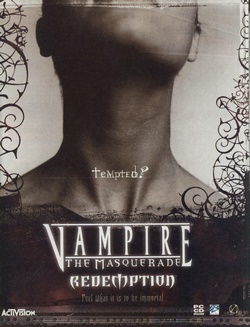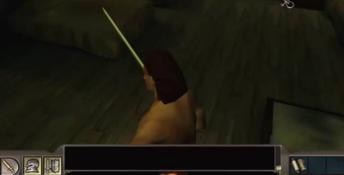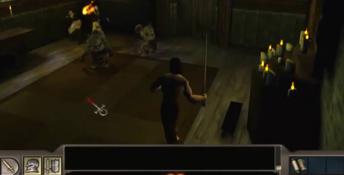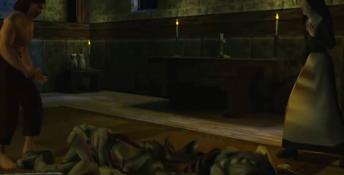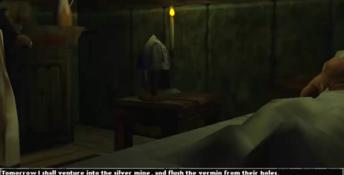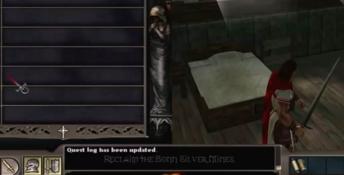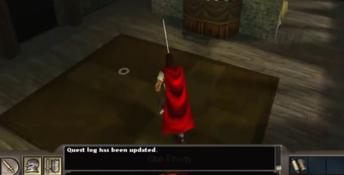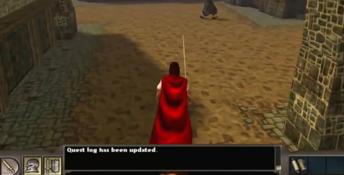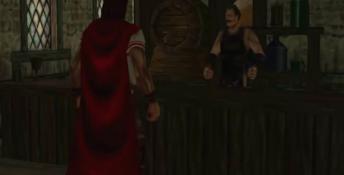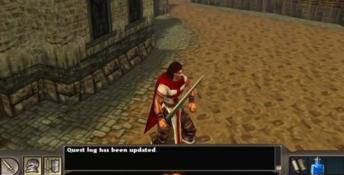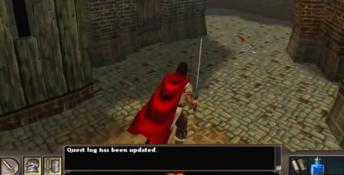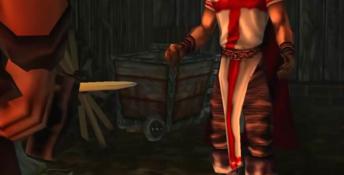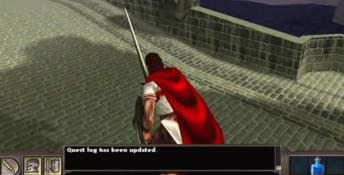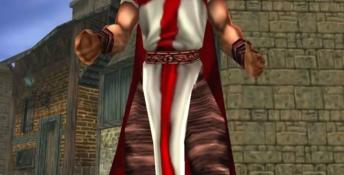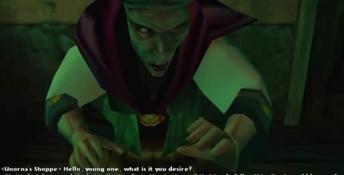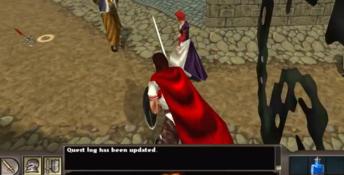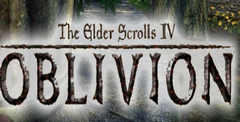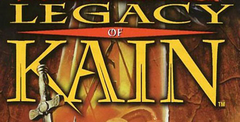Vampire: the Masquerade - Redemption

| a game by | Nihilistic Software |
| Platform: | PC |
| Editor Rating: | 7/10, based on 1 review, 4 reviews are shown |
| User Rating: | 8.0/10 - 3 votes |
| Rate this game: | |
| See also: | Games Like Apex Legends, Vampire Games, Vampire: the Masquerade |
It is a world of darkness. Beneath a bright exterior of harmless entertainment, large boxes with overexcited quotes plastered on them and pleasant magazines reaching out with a friendly hand from sunny newsagents, the computer games industry is populated by vampires. Clans of bloodsucking developers congregate in dark catacombs, leeching ideas from other clans and releasing their creations upon innocent peasants who carry on with their lives, safe in the knowledge that they've seen something similar before, that it all fits in their tiny frame of reference. But the clans are only pawns in a larger war, which dark publishing princes conduct from their impenetrable castles before descending on the customers who pace up and down games shops like cattle. And if the developers are the foot-soldiers of this vampiric empire, then the journalists are the ghouls: parasites who live off the dregs of their more creative prey and who explain away the pallor of their skin with tales of drugs, alcohol and cigarettes.
Which is another way of saying that reviewing a game nearly always boils down to telling you what other games it's like and whether it's any better or worse than them. When I tell you that Vampire is a RPG you immediately place it next to other RPGs and start drawing conclusions. Well, stop right now.
Blood Simple
We should start by saying what Vampire isn't. It isn't a free-roaming exploration game, like Baldur's Gate, although you can wander around without getting into battles if you want to. It isn't a claustrophobic game of stealth and fear from a first-person perspective, like System Shock 2, although it can be wonderfully atmospheric at times and you can go into first-person mode to get a better look at the amazing graphics. It isn't an entirely plot-and character-driven game, like Planescape: Torment, although both are absolutely central to the experience. In many ways it belongs to the Diablo school of role-playing, in that it has a linear, mission-based structure, which involves a lot of hacking and slashing. But at the same time it is much more than all that because you care about what's happening. You continue because you want to know where the story is going and because you want to see what the next environment and next monster will look like.
The main character is Christof, a 12th century crusader who is injured in the field of battle by infidels and nursed back to health by the beautiful nun Aneska. Christof falls in love with her and brings the wrath ot the church upon himself. At the same time he pisses off a clan of vampires by slaying one of their number. A rival clan decides he would make a good addition to their ranks and embraces him (the technical term for turning someone into a vampire). The rest of the game sees the fallen crusader's relentless pursuit of Aneska and a way to regain his own humanity, becoming a pawn in a great war between clans along the way in a story that twists and turns like an animal in its death throes.
A Mean Servant Of God
But another thing that Redemption is not, is a horror game. Despite the electric atmosphere, the dark dungeons and the disfigured monsters, you never really feel scared. There is a very good reason for this: you are one of the monsters. You are the one to be feared. Would Resident Evil 2 be scary if you played a brain-gnawing zombie instead of a weak human? Of course not. The point is, Vampire never tries to be scary. Instead, it allows us to act out a fantasy most people have: to be the monstrous killer rather than the helpless victim. It's a fantasy of power, of dark and forbidden power. With power comes responsibility, but not when you're a monster. You can throw off the shackles of civilisation and become an anarchic wave of violent rebellion.
Vampire tempers this chaotic drive for the sake of characterisation and plot. You have to keep control of the beast within by hanging on to the little humanity you have left. Unlike the character played by Harvey Keitel in From Dusk Till Dawn, an ex-priest who regains his faith in God only to become an unthinking killing machine when transformed into a vampire, Christof is aghast at his loss of humanity and how his new condition clashes with his beliefs.
The theme of redemption leads us nicely to that of salvation, or I should say, saving. To make the game harder you can only save in your Haven, the sate place where you can keep items and turn experience points into abilities and disciplines. If you're in the middle of a dungeon, the only way to get there is by casting the Walk The Abyss discipline. Luckily, the game automatically saves itself every time you load up a new area, but only by overwriting the last automatic save. Somehow, this system never becomes frustrating, all it does is makes you more careful.
Fiends Will Be Friends
Your party (or coterie, as it's called in the game) grows to up to four characters in some parts of the game, which means you can develop the stats for each one in different ways by exploring different disciplines.
At first, the fact that you can control other characters in your party takes away from the initial identification and empathy with Christof. But, while the beginning of the game is all about plot and character development, you quickly realise these are just a way to carry you through between battles. This isn't necessarily a bad thing, it just means it's a different type of game, beneath whose unbelievably lush exterior lies a sophisticated hack 'n' slasher. And it isn't as if the story is superfluous. It's a grandiose yarn that keeps you wanting to know more to see what's going to happen next. It does seem strange that you could conceivably play most of the game with one of the other characters, leaving Christof behind, when they are just people who have tagged along to help the central figure. This works in detriment of the role-playing in terms of depth, but it does add to the variety of gameplay and the tactics you can use in combat.
To begin with, the battles can be quite frantic and frustrating, especially when the other members of your coterie start running around or using up valuable blood points in useless spells. The key is knowing the strengths and weaknesses of each character. You can change the stance of each (defensive, neutral and offensive), have them follow you or leave them behind, and decide which weapons, disciplines and items they use during combat.
The Devil Inside
There is never any doubt whatsoever that your characters are vampires, rather than some random collection of fancy fighters with a few magical spells thrown in. You have a frenzy meter that measures how much of a grip the beast within you has. Every time a character takes a hit from an enemy your frenzy levels go up, especially if you're low on blood, and you have less and less control over them, up to the point where they'll start kicking, hacking and biting the nearest thing to them, even if it happens to be one of their friends. Your blood pool works much in the same way as mana does in other RPGs and you draw from it to use your disciplines (or spells if you prefer). You can get blood supplies from vitae bottles you'll find scattered around (or plasma bags in the modern age) or from sucking it out of pedestrians and other vampires, you can also feed off other members of your coterie. The game forces you to resort to this in many instances where vitae is hard to find. However, suck a human dry and you'll lose humanity points, making you much more likely to frenzy. Can you imagine such a humanity system in Soldier Of Fortune You'd be a slavering rabid dog within minutes. As a result, there's always a delicate balance to be kept between blood, health and discipline casting. You also have to keep in mind that a low health level affects your stats, such as strength, dexterity and stamina. Disciplines have a definitive impact on the gameplay. You use them to solve puzzles (although these seem to be rather simple and infrequent, like the one that requires you to transform into mist to get by an otherwise lethal swinging pendulum to the switch that turns it off) and to plan your attacks. Luring enemies towards you instead of rushing in like a fool, is often the best tactic. At other points, you need objects in rooms so heavily guarded the only way to reach them is by disciplines of deception and shadows.
Tongue-Tied
There's an extensive background history to the world of Vampire, as you would expect from a table-top RPG that's been around since the late 70s. It's a complete alternate world, with an intricate mesh of clans, personalities, social structures and a real sense of past. Redemption does a great job of introducing you to it all throughout the game, if you haven't been bothered to read some of the heavy tomes chronicling this history or the watered-down version in the manual. But there are still some instances where you'll wonder just what the hell the people around you are talking about.
Some of you will probably be put off by the language in the Dark Ages, with its constant use of cod-Shakespeare, littered with "thous", "thys" and "thines". As far as we know, people in the 12th century didn't speak like this. Especially in Prague and Vienna. And even more especially when they happened to be French Crusaders. But as an artificial means of creating a sense of being in a distant past it works. The Shakespearean tone isn't just linguistic though, it's embedded in some of the game's very themes. The forbidden love between Christof and Aneska echoes that of Romeo And Juliet, while Christof's inner struggle brings back memories of Hamlet.
If you fell asleep reading that last paragraph, though, you'll pleased to know Vampire doesn't explore any of this in great depth, moving quickly to exploring dungeons, caverns and castles with the sole motive of hitting things over the head with a large piece of metal.
Small City Lights
We can't emphasise enough just how incredible Vampire looks. The screenshots give you a fair idea, but you really need to see it moving to appreciate its full beauty. We guarantee that during the first few days you'll spend as much time angling the camera and going into first-person view to admire the world around you as you will playing. We'd go as far as saying that it's the best looking game we've ever seen, and we can't imagine anything beating it for a while. You could stare at the architecture, the player models and some of the monsters for hours without getting tired.
It's not just visually stunning either, the music is superb throughout and the excellent sound effects create an atmospheric environment. There is a certain trade-off to this. The cities are necessarily small and sparsely populated, and the interaction with the environment is strictly limited.
You can roam the streets as much as you like, but you have no freedom to go into all of the houses. Most of the doors are just part of the scenery and serve no function, so no matter how much you want to play out your vampiric role, slipping into the bedrooms of beautiful maidens to suck their blood before drawing your cape across your red-stained face before disappearing in a puff of smoke, it's just not possible.
For the game to feature true free-roaming in a realistically modelled city would have taken Nihilistic a decade to program and you'd need a computer the size of your front room to run it. So for the most part, this isn't a problem. Until you come to London.
The modern age levels are mostly disappointing. They're not as bad as the Xen ones in Half-Life (although they are much bigger), but they have the same effect of not quite satisfying in the same way as the rest of the game. There are some excellent parts (the temple of the followers of Set In London, for example), and they are by no means boring to play through, they just don't meet the high standards of the first part and have you feeling almost immediate nostalgia for a land of broadswords and plague-ridden streets. Not least because modern day weapons don't seem quite as effective.
London is such an awful American pastiche of cliches (bobbies, red phone boxes, red double-deckers) that it becomes impossible to suspend disbelief in the same way you can with the medieval era. The cobblestone streets, the gas streetlights, the fog, the rain and the architecture itself resemble the '30s Hollywood set for a Basil Rathbone Sherlock Holmes film. In New York, things improve considerably and you suddenly remember how fantastic the game really is. You're now an Elder vampire and your powers are greater than ever. As a consequence you spend more time exploring your disciplines.
Vampire Unmasqueraded
As long as you don't come to Vampire with the wrong expectations, you are unlikely to find a more challenging, rewarding or gorgeous RPG.
The Masquerade world is so engrossing that you don't want to leave it, its shapes and contours so exquisite you can't keep your eyes off it, its battles so demanding you can't stop rising to the challenge, its dark vampiric powers so alluring you are hypnotised and vulnerable, lost in a trance as it drains your life away. Soon, you too will look like us. Pale, bleary-eyed, afraid of the sunlight, your teeth aching with an insatiable hunger for more.
Fang Uk
And you thought vampires were scary
The original Vampire game is a table-top RPG with a huge following in America. No problem with that We may poke fun at the traditional image of bearded blokes sitting in a living room, throwing dice and majestically announcing the spell they're going to cast on a passing gnome, but it's just a game like any other. However, there are people out there, people who have jobs and lead an otherwise perfectly normal existence, who actually act out Vampire games in live action gatherings, kitted with swords and capes, wearing make-up and running around pretending to suck each other's blood. Some of these events are taking place right here in England. This isn't sad, it's downright psychotic.
Let Me Tell You A Story
Vampires Storyteller mode is unlike any other form of multiplayer you have encountered in a computer game.
As the name gives away, one person must take on the role of the Storyteller, which is effectively the equivalent of a Dungeon Master in a table-top AD&D game. The Storyteller dishes out experience points, places objects and monsters (he can even control them directly), sparks off events and generally manages a story. Each multiplayer game is a story where the players are actors who can just chat with each other, make decisions on where to go and what to do and have a direct influence on the way the game goes. The Storyteller -must react and sometimes change plot developments to suit the players actions. Obviously, the better the Storyteller the better the game, but Redemption does come with two chronicles (one in the Dark Ages and one in the modem world) that only need minimal supervision. And Nihilistic is promising more to come. We'll be covering the multiplayer aspect of Vampire in more detail in our new Online section in the near future, as the Internet community explodes with life. And, believe us, it will.
Discipline And Punish
There are around 15 discipline groups with a varying number of disciplines in each. Which ones you decide to follow is largely determined by your style of gaming and, likewise, how you go into battles will be determined by the discipline paths you have chosen. Some are ideal for straightforward hacking, like Fortitude and Feral Claws, while others encourage a more paused approach to combat, using stealth and mental control, such as Obfuscate and Domination.
There are some disciplines which you need to develop in order to make your undead adventure a much smoother ride, and are grouped mostly under the Common Disciplines: Feed (the good old teeth in the jugular), Blood Healing (an exchange of blood for health) Awaken (to revive coterie members who have fallen into torpor), and Walk The Abyss (which opens up a portal directly to your haven - this only closes once you have gone to the place where you cast it from). You'll also find Spirit's Touch (to identify objects) and Cloak Of Shadows (a certain degree of invisibility) pretty invaluable too. You often find scrolls lying around that allow you to use these disciplines even if you haven't learnt them, but relying on them can be a dangerous business: once you've run out, you're stuck.
Each discipline has five levels, although you'll need plenty of experience points to reach the higher ones. Levels affect the discipline's length, power and the amount of blood needed to cast them.
Here's a look at some of the more interesting disciplines.
Download Vampire: the Masquerade - Redemption

System requirements:
- PC compatible
- Operating systems: Windows 10/Windows 8/Windows 7/2000/Vista/WinXP
Game Reviews
What we thought
"As long with the wrong expectations, you are unlikely to find a more challenging, rewarding or gorgeous RPG."
What you said
People say:
- "Could I possibly borrow the copy of Vampire: The Masquerade that Mark Hill reviewed as it sounds so much better than the shallow, boring and uninspiring game I have had the misfortune to play. 90 per cent? I wouldn't give it 60 per cent! Yes, it looks good but that is where the praise ends. The game is as linear as a Roman road. It is void of all atmosphere. The combat system is pathetically mundane and requires little or no skill. The AI for both the coterie and enemies is a complete joke and finally, the pathfinding has got to be the worst that I have ever encountered. I have been gaming since the days of the ZX81 and this has got to be one of the greatest let downs in gaming history. When will games designers learn that fancy graphics do not make a great game? It is the gameplay.''
- "Normally the best advice you can get is to wait for the PC review before buying the game. However, I had to have a copy of Vampire The Masquerade and so I pre-ordered it. It was still on order when I read your review and I began to get rather excited about receiving the game. When it arrived, I installed it, ran it and... wow - what a game, truly deserving your Award For Excellence. So, where's the but?... Well, let's re-cap the review. Mark Hill mentioned that "you are unlikely to find a more, challenging, rewarding or gorgeous RPG." Chris Anderson said it is "the new benchmark for the role-playing genre." Dave Woods called it "engrossing and brilliant." Finally Richie Shoemaker pointed out that "it's certainly the direction I'd like the genre to go." As an RPG fan, you'll get no argument from me but... why only 90 per cent? The comments I've quoted sound like a benchmark game to me, so why score it less than System Shock 2? Don't get me wrong, I loved SS2, I even voted for it as last year's game of the year. However, SS2is simply not as good as Vampire. Vampires graphics, interface, story and sound/music are unsurpassed in the RPG genre. No, it's not free-roaming, nor are many other RPGs. Yes, it's very linear, but if we're honest SS2 was pretty linear itself (though It disguised it well) Come on ZONE, admit that Vampire is the RPG benchmark and, readers, go out and buy it immediately."
Comment
These two letters pretty much summarise the two opposite reactions Vampire has been getting from gamers worldwide. Some can't get beyond the fact that the game is so linear, probably because screenshots had led them to expect something completely different As for being the new RPG benchmark, that accolade falls to Deus Ex.
What we thought
"The Masquerade world is so absorbing that you don't want to leave it, its shapes and contours so exquisite you can't keep your eyes off it, its battles so demanding, you can't stop rising to the challenge, its dark vampiric powers so alluring you are hypnotised and vulnerable, lost in a trance as it drains your life away."
What you said
People say:
- Having played Vampire all the way through, I would say that the game is quite good. The graphics are fantastic, the combat interface is easy to control and the storyline is genuinely interesting. Although, admittedly, the plot is a little too linear and occasionally the AI is somewhat suspect but, despite these failings, it's still a superb RPG. But it's not quite up to Deus Bts standards. I wouldn't call it a Classic, but it definitely deserves an Award For Excellence in my book.
- I've been an avid reader of your magazine for quite some time now and I generally find your reviews to be pretty accurate. Being a huge RPG fan, I thought that I'd invest in a copy of Vampire. True to your review, I wasn't disappointed. Never before have I seen such luscious graphics, while the gameplay is truly amazing. The only criticism I have, is that, while the plot is engrossing, it's far too linear. It's a shame because, if it had a branching storyline, it would surely have been the best RPG of all time.
Comment
As we stated in our review, Vampire suffers slightly from a linear storyline. Apart from this, there weren't many other major criticisms that we could level at it Sure, System Shock 2 and Deus Ex are undoubtedly superior games, but if you're more into mythical RPGs, then you won't find a better one than this. As both Simon and Paul state in their letters, it's the graphics and gameplay that make Vampire so entertaining. But it could have been even better if it hadn't followed such a rigid structure.
The computer version of White Wolf's popular paper-and-pencil RPG series drew only slightly less crowds at E3 than Activision's biggest gun. Quake III. Then again, Quake III doesn't let you drag villagers into a dark alley and drink their blood. Developed by programmers who have worked on hits such as Dark Forces II: Jedi Knight, Descent, and StarCraft, Vampire centers around Christof Romauld, a knight batding the bloodsucking Kindred. The game's action/RPG quest spans medieval Prague and Vienna to modern-day London and New York, all re-created via the game's impressive 3D engine. The mouse-only interlace should keep things simple, and characters from other White Wolf games will make guest appearances. In fact, Nihilistic is being careful to preserve the paper-and-pencil version's appeal and flexibility; the in-development multiplayer component should reflect this, too. If the preview version is any indication, fens of the traditional game and folks sick of waiting for Legacy of Kain's sequel will want to sink their teeth into Vampire. Heh.
Snapshots and Media
PC Screenshots
See Also
That's most likely the question you're asking yourself and the reason you are reading this review. So let's cut to the chase; yes, you should buy Oblivion' probably.
Legacy of Kain is set in the not-so-scenic land of Nosgoth, where peasants huddle in villages for protection from vampires, zombies and other horrors roaming the world.
